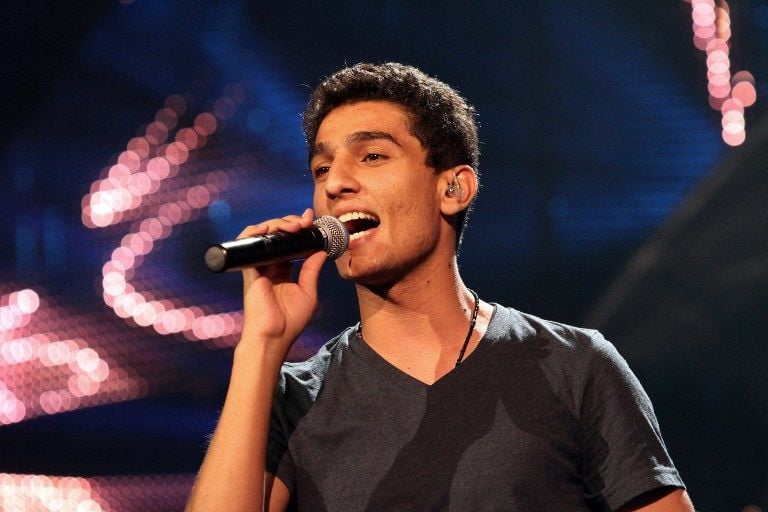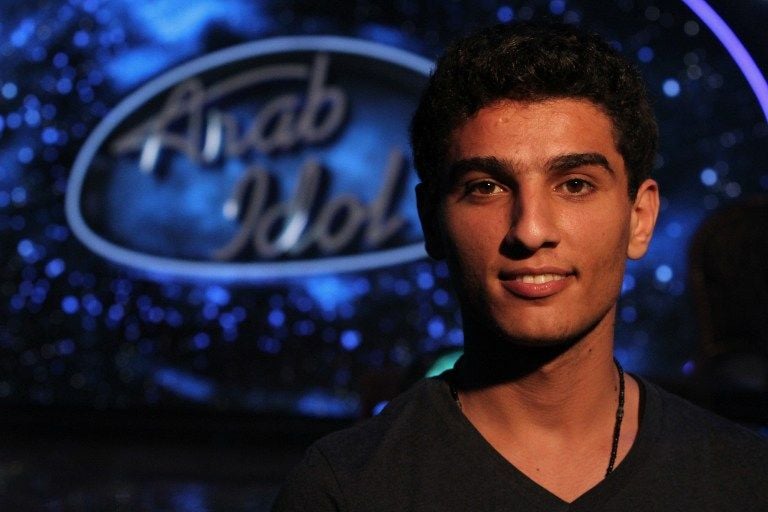Mohammed Assaf.
The golden voice of a young man from a Gaza refugee camp has enchanted viewers of Arab Idol, broadcast weekly to huge audiences across the Middle East, making him a favourite to win the final of the television singing contest.
Mohammed Assaf (22) won massive support from viewers enthralled by his rendition of traditional love songs and laments for the Palestinian cause. He has also succeeded in uniting Palestinians in Gaza, the West Bank and the diaspora behind his efforts to win.
Assaf, who often performs wearing a traditional black-and-white chequered keffiyeh, is one of 12 finalists in the competition, broadcast by the Saudi-owned MBC1. Last year's winner secured a lucrative recording contract and was presented with a car.

Posters of him hang in homes and shops all over the West Bank and Gaza. An open-air broadcast on Friday evening in Ramallah attracted thousands of viewers, and restaurants in Gaza that have shown the programme on big screens have been packed.
Palestine's President Mahmoud Abbas and Prime Minister Salam Fayyad, have telephoned the young man to offer support and encouragement. Two mobile phone companies have offered cut-price texts for viewers who vote by SMS after watching performances and hearing the verdicts of a panel of celebrity judges.
Hamas criticism
But Assaf's performances have been met with criticism from some conservative Islamic groups, including Hamas, who disapprove of the western-style TV programme. "There has been no direct criticism, but we hear that some sheikhs at Friday prayers don't like this," his older brother Shadi, a taxi driver, said at the family's home in Khan Younis. "Always there are some enemies of success."
Assaf, who has had no formal training, began performing at weddings and private parties in Gaza as a child. He is currently in Beirut for the filming of Arab Idol. Last year when the Guardian met him in Gaza, he said that although his repertoire consisted mainly of patriotic songs, he also wanted to sing love songs. "But there's nowhere to perform them in Gaza," he said.
Hamas, he said last year, discouraged artists and musicians. He had been arrested more than 20 times by Hamas security officials. "Once I was arrested for a week. They kept asking me to sign a pledge not to sing. But my message as a Palestinian is that we not only speak or fight or shoot, but we also sing."
But since being catapulted to fame, Assaf has not abandoned his roots or his beliefs. He has spoken against the Israeli occupation and has supported hunger strikes by Palestinian prisoners in Israeli jails. "If I had to choose between winning the Arab Idol title and the freedom of [prisoner] Samer Issawi, I would choose freedom for the Palestinian hero whose steadfastness is peerless," he told the Palestinian news website Ma'an last month. "I can't differentiate between my art and my patriotic attitude."
Growing up with music
Shadi Assaf (28) said the children of the family had grown up with music in the house. "Our father would listen to famous Arab singers," he said. Three of the seven siblings have performed in public.
Mohammed had already had offers of recording contracts, said Shadi, but was waiting to see the outcome of the competition. "At first he didn't expect to get a lot of votes, he didn't think he could beat the contestants from Egypt and the Gulf states. He said it's good to take part even if he didn't get very far because it's good for people to know that even Palestinians living under siege can have talent and can survive. We have been surprised at the votes for him from all over the world."
The Assaf family, along with others all over Gaza, the West Bank and the Arab world, gather to watch Arab Idol every Friday evening. "When I see him on TV, I feel tears because I miss him, but I also feel very happy," said Shadi. "If he wins, I'm sure he will live abroad, but he will always come back to Gaza to see us." – © Guardian News and Media 2013